Methodological Issues
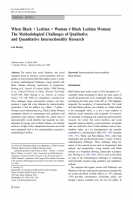
Bowleg, L. (2008). When Black + Woman + Lesbian? ≠ Black Lesbian Woman: The methodological challenges of qualitative and quantitative intersectionality research. Sex Roles, 59(5-6), 312-325. doi: 10.1007/s11199-008-9400-z
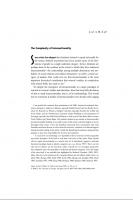
McCall, L. (2005). The complexity of intersectionality. Signs, 30(3), 1771-1800. doi: 10.1086/426800
Quantitative Methods
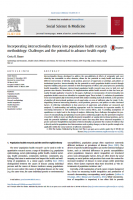
Bauer, G. R. (2014). Incorporating intersectionality theory into population health research methodology: Challenges and the potential to advance health equity. Social Science and Medicine, 110, 10-17. doi: 10.1016/j.socscimed.2014.03.022

Bauer, G. R., & Scheim, A. I. (2019). Methods for analytic intercategorical intersectionality in quantitative research: Discrimination as a mediator of health inequalities. Social Science and Medicine. doi: 10.1016/j.socscimed.2018.12.015
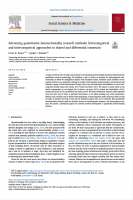
Bauer, G. R., & Scheim, A. I. (2019, 2019/04/01/). Advancing quantitative intersectionality research methods: Intracategorical and intercategorical approaches to shared and differential constructs. Social Science and Medicine, 226, 260-262. doi: 10.1016/j.socscimed.2019.03.018
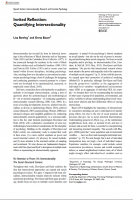
Bowleg, L., & Bauer, G. R. (2016). Invited reflection: Quantifying intersectionality. Psychology of Women Quarterly, 40, 337-341. doi: 10.1177/0361684316654282
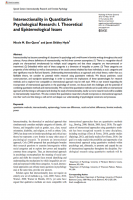
Else-Quest, N. M., & Hyde, J. S. (2016). Intersectionality in quantitative psychological research I: Theoretical and epistemological issues. Psychology of Women Quarterly, 40(2), 155-170. doi: 10.1177/0361684316629797
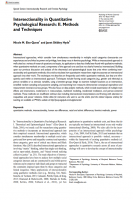
Else-Quest, N. M., & Hyde, J. S. (2016). Intersectionality in quantitative psychological research II: Methods and techniques. Psychology of Women Quarterly, 40(3), 319-336. doi: 10.1177/0361684316647953
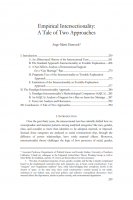
Hancock, A.-M. (2013). Empirical intersectionality: A tale of two approaches. UC Irvine Law Review, 3(2), 259-296.
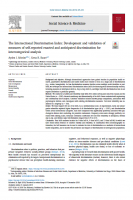
Scheim, A., & Bauer, G. R. (2019). The Intersectional Discrimination Index: Development and validation of measures of self-reported enacted and anticipated discrimination for intercategorical analysis. Social Science and Medicine, 226, 225-235. doi: 10.1016/j.socscimed.2018.12.016

Hancock, A.-M. (2007). When multiplication doesn't equal quick addition: Examining intersectionality as a research paradigm. Perspectives on Politics, 5(1), 63-79. doi: 10.1017/S1537592707070065
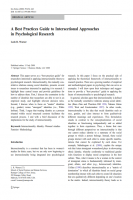
Warner, L. (2008). A best practices guide to intersectional approaches in psychological research. Sex Roles, 59, 454-463. doi: 10.1007/s11199-008-9504-5
Qualitative Methods
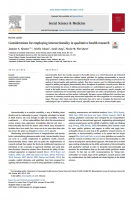
Abrams, J. A., Tabaac, A., Jung, S., & Else-Quest, N. M. (2020, 2020/08/01/). Considerations for employing intersectionality in qualitative health research. Social Science and Medicine, 258, 113138. doi: 10.1016/j.socscimed.2020.113138
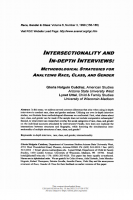
Cuadraz, G. H., & Uttal, L. (1999, August 3, 2006). Intersectionality and in-depth interviews: Methodological strategies for analyzing race, class, and gender. Race, Gender & Class, 6, 156-181.

